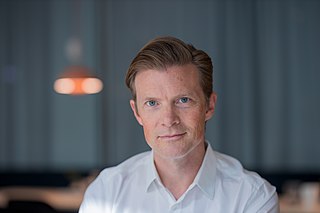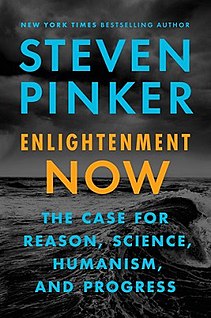
The Cato Institute is an American libertarian think tank headquartered in Washington, D.C. It was founded as the Charles Koch Foundation in 1974 by Ed Crane, Murray Rothbard, and Charles Koch, chairman of the board and chief executive officer of the conglomerate Koch Industries. In July 1976, the name was changed to the Cato Institute. Cato was established to have a focus on public advocacy, media exposure and societal influence. According to the 2017 Global Go To Think Tank Index Report, Cato is number 15 in the "Top Think Tanks Worldwide" and number 10 in the "Top Think Tanks in the United States".
Progress is advancement to a higher or more developed state.

Bryan Douglas Caplan is an American economist and author. Caplan is a professor of economics at George Mason University, research fellow at the Mercatus Center, adjunct scholar at the Cato Institute and former contributor to the Freakonomics blog as well as publishing his own blog, EconLog. He is a self-described "economic libertarian". The bulk of Caplan's academic work is in behavioral economics and public economics, especially public choice theory.

Julian Lincoln Simon was an American professor of business administration at the University of Maryland and a Senior Fellow at the Cato Institute at the time of his death, after previously serving as a longtime economics and business professor at the University of Illinois at Urbana-Champaign.

Johan Norberg is a Swedish author and historian of ideas, devoted to promoting economic globalization and what he regards as classical liberal positions. He is arguably most known as the author of In Defense of Global Capitalism (2001) and Progress: Ten Reasons to Look Forward to the Future (2016). Since 15 March 2007 he has been a senior fellow at the Cato Institute, and in January 2017 he became the executive editor at Free To Choose Media.

Joseph Telushkin is an American rabbi, lecturer, and bestselling author of more than 15 books, including volumes about Jewish ethics, Jewish literacy, as well as the book Rebbe, a New York Times bestseller released in June 2014.

Helena Norberg-Hodge is founder and director of Local Futures, previously known as the International Society for Ecology and Culture (ISEC). Local Futures is a non-profit organization "dedicated to the revitalization of cultural and biological diversity, and the strengthening of local communities and economies worldwide."

In Defense of Global Capitalism is a book by Swedish writer Johan Norberg promoting economic globalization and free trade. The book was originally published in May 2001 by the Swedish think tank Timbro. Since then, a number of translations into other languages have followed.

The Happy Planet Index (HPI) is an index of human well-being and environmental impact that was introduced by the New Economics Foundation (NEF) in July 2006. The index is weighted to give progressively higher scores to nations with lower ecological footprints.

The Stockholm Environment Institute, or SEI, is a non-profit, independent research and policy institute specialising in sustainable development and environmental issues. SEI works on climate change, energy systems, water resources, air quality, land-use, sanitation, food security, and trade issues with the aim to shift policy and practice towards sustainability.
The Improving State of the World: Why We're Living Longer, Healthier, More Comfortable Lives On a Cleaner Planet (ISBN 1930865988) is a 2007 book by Indur M. Goklany, published by the Cato Institute. As per the title, it argues that the state of the world and humanity is rapidly improving.
The Economist Intelligence Unit’s where-to-be-born index attempts to measure which country will provide the best opportunities for a healthy, safe and prosperous life in the years ahead. It is based on a method that links the results of subjective life-satisfaction surveys to the objective determinants of quality of life across countries along with a forward-looking element.

The Shock Doctrine: The Rise of Disaster Capitalism is a 2007 book by the Canadian author and social activist Naomi Klein. In the book, Klein argues that neoliberal free market policies have risen to prominence in some developed countries because of a deliberate strategy of "shock therapy.” This centers on the exploitation of national crises to establish controversial and questionable policies, while citizens are too distracted to engage and develop an adequate response, and resist effectively. The book suggests that some man-made events, such as the Iraq War, were undertaken with the intention of pushing through such unpopular policies in their wake.
Human development is the science that seeks to understand how and why the people of all ages and circumstances change or remain the same over time. It involves studies of the human condition with its core being the capability approach. The inequality adjusted Human Development Index is used as a way of measuring actual progress in human development by the United Nations. It is an alternative approach to a single focus on economic growth, and focused more on social justice, as a way of understanding progress.

Population projections are attempts to show how the human population living today will change in the future. These projections are an important input to forecasts of the population’s impact on this planet and humanity’s future well-being.

The Sustainable Development Goals (SDGs) are a collection of 17 global goals designed to be a "blueprint to achieve a better and more sustainable future for all". The SDGs, set in 2015 by the United Nations General Assembly and intended to be achieved by the year 2030, are part of UN Resolution 70/1, the 2030 Agenda.
John Michael Greer is an American author and druid who writes on ecology, politics, appropriate technology, oil depletion and the occult.
Kristy Dempsey is a children's book author currently living in Belo Horizonte, Brazil She won the 2015 Golden Kite Award for Picture Book Text on her book A Dance Like Starlight: One Ballerina's Dream.
Peak farmland is the maximum usable amount of land needed for crop cultivation for a given region. Supporters of the peak farmland theory argue that even with the growing world population, the need for more farmland is decreasing, as food production yields per acre of farmland are rising faster than the global demand for food. This is supported by the fact that the area dedicated to farmland in some countries, both developed and developing, has already begun to decline. Globally, while the total amount of arable land is still increasing, the area of permanent pasture has been in decline since 1998, with at least 60 million hectares no longer grazed. It is argued that other countries, such as the United States, are at their peak farmland now.

Enlightenment Now: The Case for Reason, Science, Humanism, and Progress is a 2018 book written by Canadian-American cognitive scientist Steven Pinker. It argues that the Enlightenment values of reason, science, and humanism have brought progress; shows our progress with data that health, prosperity, safety, peace, and happiness have tended to rise worldwide; and explains the cognitive science of why this progress should be appreciated. It is a follow-up to Pinker's 2011 book, The Better Angels of Our Nature.













